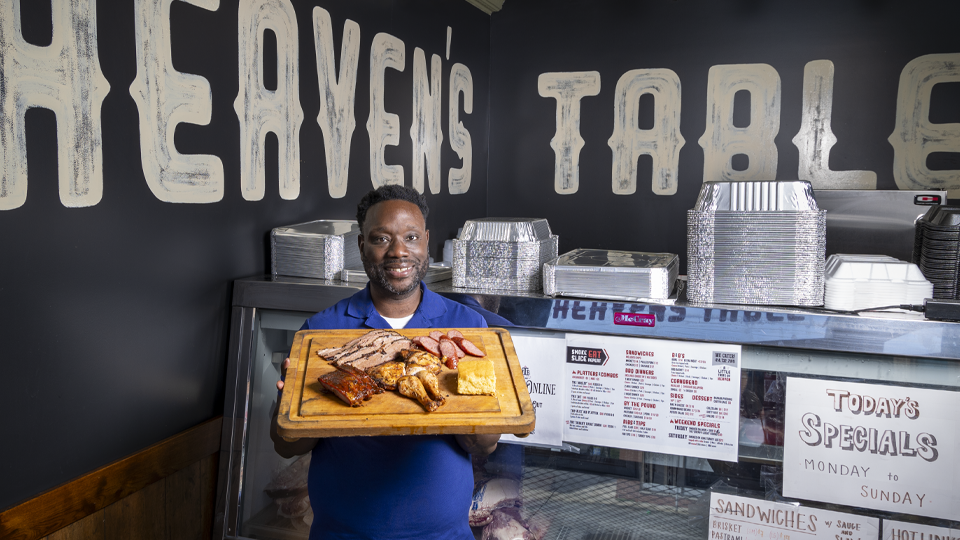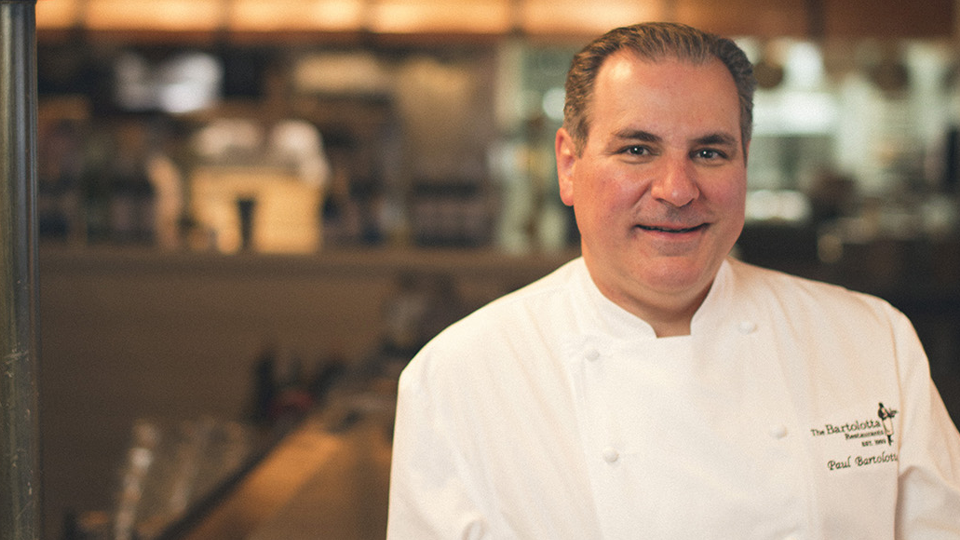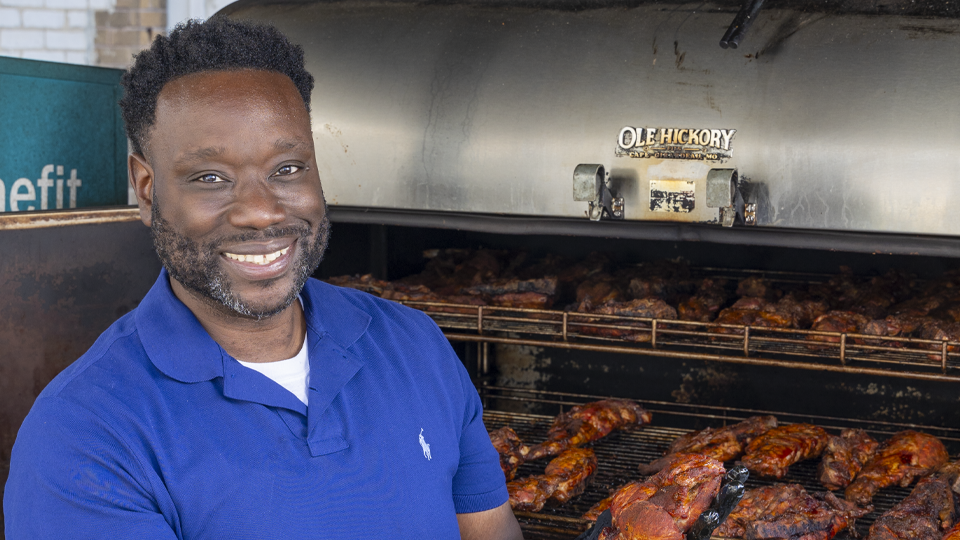The COVID-19 pandemic threw the hospitality industry into chaos. MATC alumni recount how they adapted to survive or made the difficult decision to walk away.

Jason Alston serves up savory specialties at Heaven's Table BBQ
Restaurants can stomach practically anything.
For thousands of years, the hospitality industry has withstood and survived depressions, famines, wars, revolutions, all sorts of natural disasters, even plagues.
"Restaurants have been around for centuries and have endured all sorts of hardships, but people always return because our industry is constantly evolving and growing and welcoming of people," said Paul Bartolotta, an MATC graduate, two-time James Beard award winner and one of the country's Superstar Chefs, according to Food & Wine magazine. "We make people feel welcome, and there will always be a need for that."
In 2020, a modern plague descended on the world. The COVID-19 pandemic shuttered restaurants and eateries for months, limited customer capacity and popularized delivery and carryout. It altered the way the industry works forever, according to MATC alumni working in the business.
We asked three graduates of MATC's respected Culinary Arts program to look back at how they managed their operations during the pandemic and to share the lessons they learned as they navigated the new normal.

Paul Bartolotta
Paul Bartolotta
The Bartolotta Restaurants,
bartolottas.com
Training for years in Europe, winning two national James Beard awards, and opening and operating 17 dining destinations wasn't enough to prepare chef Paul Bartolotta for the pandemic.
Closing the doors of so many restaurants was one of the worst days in his long career, Bartolotta said. But going through the experience gave him a renewed sense of appreciation for his workers, his guests and his craft.
"As a business owner, taking care of the people that work for you and your community is always your top priority, but the pandemic really brought that to the forefront. Without our hardworking team members, we don't have a business. They are the beating heart of our company and the face of our hospitality," Bartolotta said.
"The pandemic also showed us the power of our communities and how people supported the restaurant industry throughout Milwaukee and the rest of the world," he added. "As we reopened and had to adjust our business models, we were fortunate to have loyal, patient guests who understood our struggles, and they were happy to support our industry. I can't thank our local community enough for standing by us during that difficult time."
When the restaurants closed, Bartolotta set up a dry goods pantry for his employees to access food and supplies, and he kept a core leadership team employed full time through the closures. He also used the quarantine to reevaluate business practices and structures.
"It was a time of great reset for our company and one that I believe made us stronger in the long run," he said. "The wonderful thing about the hospitality industry is that people will always want to go out to eat and try new foods and gather with friends and family."
Bartolotta has visited MATC numerous times to talk with students, and he often reminds them to have a realistic view of the industry they want to make their career.
"Hospitality is so much more than a service industry. We are in the people business first and foremost. It teaches camaraderie, teamwork, personal responsibility, how to take care of other people," he said. "The training and education that I received at MATC helped prepare me, and all of the students who enroll there, to navigate real-world scenarios by providing an incredible foundational education that leaves students feeling confident as they embark on their professional careers."
AJ Dixon
Lazy Susan, closed April 2023
AJ Dixon is a professional chef and will always love cooking.
But during the pandemic, she learned to dislike the grueling pace of the restaurant business.
Dixon, a 2002 MATC Culinary Arts graduate, owned and operated Bay View's popular Lazy Susan from 2014 until April 2023. The stress of running her own business, not having any partners, cooking almost all of the food and never seeing her family were already taking a toll.
The pandemic pushed her over the edge.
"If I had to do it all over again, I would have cut my losses, shut my doors and never looked back when COVID hit," Dixon said.
Dixon grew up on Milwaukee's south side. Her late mother, Susan, loved food and loved to cook. AJ grew up in the kitchen watching and eating everything her mother created. She earned her degree at MATC, then cooked at various restaurants in Milwaukee.
In 2014, she opened Lazy Susan to rave reviews and a solid customer base. "I'm very proud of what I did," she said. "I had a really great restaurant that routinely was in the Top 30," The Top 30 is an annual list of the area's best restaurants published by the Milwaukee Journal Sentinel's dining critic.
In early 2020, she foresaw the havoc COVID could wreak and emailed her insurance company about possible problems. "I was sad, scared and concerned all the time," Dixon said. "When we opened the doors again for indoor dining, it should have been easier, but it just kept getting harder."
Dixon was mentally fatigued and physically exhausted. "My hands hurt every day. I was tired every day. Some days I sat in my office and cried. I was going down a deep, dark path and I needed to make some changes to pull myself out of it."
After talking to her staff members, Dixon decided to close in April. "Closing was the hardest decision I had to make, but the best one I ever had made for myself. I loved my restaurant, the staff, the friends I made along the way and more. Lazy Susan was more than just a restaurant, it was a big family."
Dixon now works as a corporate chef, a Monday-to-Friday gig with benefits and a retirement plan. She would like to teach cooking someday.
Although Dixon loved having a restaurant, the business can be brutal, she acknowledged. "Restaurants and restaurant workers need better support and better compensation," she said. "Burnout is real. And in the end, it took me a long time to realize that I wasn't a failure."
Opening and operating a restaurant was one chapter of her life, she said. "Now, I'm on to other chapters."

Jason Alston
Jason Alston
Heaven's Table BBQ
heavenstablebbqmke.com
Plain and simple, Jason Alston didn't know what to do when COVID hit.
"There was no plan," said Alston, shaking his head. "Suddenly you had to find a way to provide for your customers, your employees and your family."
In 2018, Alston opened Heaven's Table BBQ inside the Crossroads Collective food hall on Milwaukee's east side. By the spring of 2020, business was cooking. "We were hot, and we were climbing the charts," he said. "We had great momentum."
Then COVID came and the restaurant shut down. Fortuitously, Alston had recently purchased a cargo van, so he delivered food whenever and wherever he could. He dropped off dinners all over the city to make sure his employees got paid.
And he appeared on Quarantine Kitchen, a Facebook Live cooking show featuring tips and recipes to make at home using basic ingredients and pantry staples. In the episode, Alston showed viewers tips and tricks to make a smoked brisket Philly cheese steak.
He did almost anything he could think of to keep busy.
"I grew up in a single-parent home, and many times I had to just figure something out myself. I couldn't sit around and mope," Alston said. "But I have always had a lot of drive in me, good or bad, and I just stayed focused and prayed a lot. I tried not to worry about restaurants closing down around me."
In the fall of 2020, he was renovating a new carryout space a few miles west of the Collective on West North Avenue, located next to a residential neighborhood and near a few other restaurants.
As COVID precautions and regulations were eliminated, Alston discovered his customers preferred delivery and takeout. Getting them to come and sit down took more effort than simply opening the door.
"Our lives are moving faster all the time, so people are learning to take their food and go," he said. "Plus, people want a story attached to their food to make it special. We need to make the experience fun and creative for them."
Alston, who also serves as an instructor at MATC's Culinary Arts program, tells students to be prepared. "I ask them about their visions and about their dreams, but I tell them to create a plan now to develop their brand," he said. "Know the limitations you have, adjust and prepare for reality."
Alston plans to open a second location in the future and has developed a nonprofit organization called Chosen Generation. He visits schools and correctional facilities to tell his personal story — a journey that includes family troubles, school expulsions, arrests and prison time.
"I want to help others avoid the mistakes I made," Alston said. "There's nothing more influential than talking to somebody that's been in your shoes. I try to help others to think about the consequences before they engage."
Learn more about the Culinary Arts and Hospitality Management programs at matc.edu.
